The Entrepreneurs
Catch the Sun – around the world, around the clock
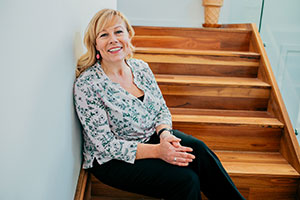 Marketing agencies and marketing departments have changed considerably over the past decade. They now operate in a connected world where technology is ubiquitous, and the customer’s use of multiple devices demands a constant supply of fresh and engaging content. These changes have required new skills from marketers and specialisation in constantly changing technologies and processes. This fast-paced, always-on world demands quick turnaround times from the modern marketing agency and Catch the Sun Communications (CTS) is a Canberra-based virtual freelance communications hub that is uniquely positioned to service this market.
Marketing agencies and marketing departments have changed considerably over the past decade. They now operate in a connected world where technology is ubiquitous, and the customer’s use of multiple devices demands a constant supply of fresh and engaging content. These changes have required new skills from marketers and specialisation in constantly changing technologies and processes. This fast-paced, always-on world demands quick turnaround times from the modern marketing agency and Catch the Sun Communications (CTS) is a Canberra-based virtual freelance communications hub that is uniquely positioned to service this market.
Kinetic Performance Technology – driving the success of athletes and coaches through technology
 Kinetic Performance Technology was founded in 2002 to bring power monitoring to the weights room.
Kinetic Performance Technology was founded in 2002 to bring power monitoring to the weights room.
Originally the company provided a range of different products including altitude houses for altitude simulation training. However, in the past 7 years they have specialised in providing GymAware, a device which measures the performance of the athlete in the weights room.
Mineral Carbon International – Recycling CO2 a competitive advantage for Australia?
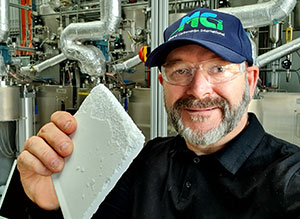 With a year marked by bushfires, hailstorms and a global pandemic; climate change and the decisions we make today are going to determine the challenges we face in the future.
With a year marked by bushfires, hailstorms and a global pandemic; climate change and the decisions we make today are going to determine the challenges we face in the future.
The innovative carbon engineering technology developed by Canberra based Mineral Carbonation International (MCi) provides a decarbonisation solution for industries such as mining, manufacturing, cement, steel and energy. Not reliant on carbon pricing, offsets or subsidies; MCi creates products from CO2 emissions by using mineral feedstocks to combine with CO2 to create valuable materials for use in manufactured products.
As technologies improve to capture carbon, the question is what will we do with it? Store it or use it?
Cogito Group - the people behind the technology keeping you safe
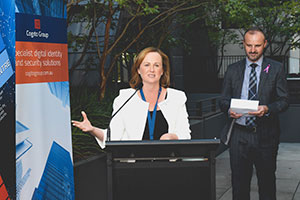 Cogito Group is a cyber security company specialising in authentication, encryption and data protection, the technology that protects the storage, processing and management of sensitive information. Founded in Canberra in 2011, Cogito Group began in a garage in Weetangera. Husband and wife team, Bernadette and Richard Brown quickly expanded to an office at the back of the Hawker shops and then moved their growing team to substantially larger premises in Barton. They also began exporting their services globally, setting up an office in Wellington.
Cogito Group is a cyber security company specialising in authentication, encryption and data protection, the technology that protects the storage, processing and management of sensitive information. Founded in Canberra in 2011, Cogito Group began in a garage in Weetangera. Husband and wife team, Bernadette and Richard Brown quickly expanded to an office at the back of the Hawker shops and then moved their growing team to substantially larger premises in Barton. They also began exporting their services globally, setting up an office in Wellington.
Wildlife Drones – from accidental entrepreneur to world leading technology
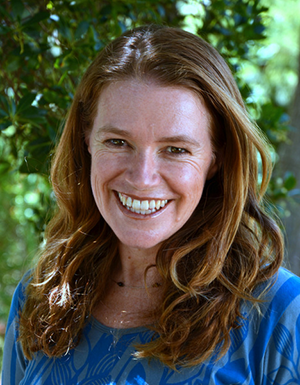 What started off as a grant-funded research project for ecologist Dr Debbie Saunders, has turned into Wildlife Drones, a company providing world-leading radio-tracking drone systems.
What started off as a grant-funded research project for ecologist Dr Debbie Saunders, has turned into Wildlife Drones, a company providing world-leading radio-tracking drone systems.
Like most startups, the idea started many years ago with a problem that needed solving. Debbie was studying the movements of the Swift Parrot, a small critically endangered bird that migrates between Tasmania and mainland Australia. One of the biggest challenges facing conservationists tracking endangered animals is that they have to manually track one animal at a time, on foot and very often in rugged and remote terrain. This limits the number of animals that can be monitored.
Debbie was talking with a colleague who researched lions.
Smart Blox – on a mission to make renewable energy accessible to all
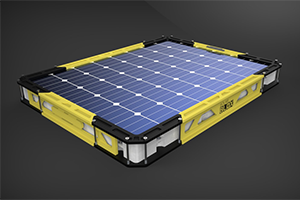 With over 2 million households1 now having solar panels installed, renewables are no longer just a nice-to-have they have become more of a necessity. While in many parts of Australia we are lessening our impact on the environment, Smart Blox is attempting to solve the problem of what happens on the fringes. The Canberra-based company believes that there is a gap between technology and the people who consume energy on a daily basis. Not everyone has the financial ability to move to solar and in some locations it’s not practical or even available. Smart Blox believes that this gap is caused by an accessibility problem and this is the biggest hurdle that we need to overcome in our journey towards a renewable energy future.
With over 2 million households1 now having solar panels installed, renewables are no longer just a nice-to-have they have become more of a necessity. While in many parts of Australia we are lessening our impact on the environment, Smart Blox is attempting to solve the problem of what happens on the fringes. The Canberra-based company believes that there is a gap between technology and the people who consume energy on a daily basis. Not everyone has the financial ability to move to solar and in some locations it’s not practical or even available. Smart Blox believes that this gap is caused by an accessibility problem and this is the biggest hurdle that we need to overcome in our journey towards a renewable energy future.
mHITs – 5 Lessons on how to disrupt yourself
 mHITs Limited is a Canberra-based FinTech mobile remittance pioneer that has developed a simple way to tackle the problem of global wealth inequality.
mHITs Limited is a Canberra-based FinTech mobile remittance pioneer that has developed a simple way to tackle the problem of global wealth inequality.
For migrants, sending money home to families overseas can be problematic if the recipient does not have a bank account. According to Harold Dimpel, the founder and CEO of mHITs, there are about 2.5 billion people in the world who do not have a bank account (the unbanked) and there are about 4 billion people in the world who do not use a bank account regularly or at all (the underbanked). This might be because they do not have a formal job, don't receive a regular income or they are not formally engaged in the economy.
Liquid instruments – A Canberra company helping to unlock the next great discoveries
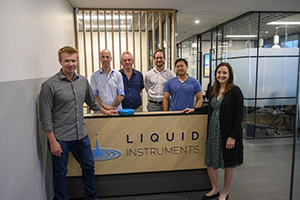 Canberra is home to an innovative company that has the potential to fundamentally change the test and measurement industry. Liquid Instruments’ Moku:Lab product replaces 12 instruments in a lab with one single multifunctional device. The spin-out from the Australian National University (ANU) has a unique approach that combines precision hardware with the versatility of software. It delivers solutions for professional scientists, engineers and students working in research and industrial labs across industries such as telecommunications, aerospace, defence and electronics manufacturing. Moku:Lab provides the same functionality as tens of thousands of dollars’ worth of equipment but at a fraction of the cost offered by the well-established test and measurement hardware market.
Canberra is home to an innovative company that has the potential to fundamentally change the test and measurement industry. Liquid Instruments’ Moku:Lab product replaces 12 instruments in a lab with one single multifunctional device. The spin-out from the Australian National University (ANU) has a unique approach that combines precision hardware with the versatility of software. It delivers solutions for professional scientists, engineers and students working in research and industrial labs across industries such as telecommunications, aerospace, defence and electronics manufacturing. Moku:Lab provides the same functionality as tens of thousands of dollars’ worth of equipment but at a fraction of the cost offered by the well-established test and measurement hardware market.
New VR Escape Room - even grandma can play!
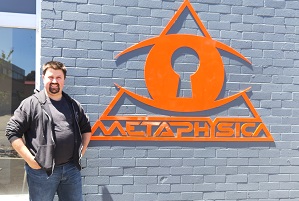 Who would have thought that escape rooms would become a global phenomenon? But there has been a steady growth in the number of rooms around the globe. For the uninitiated, an escape is a physical adventure game.
Who would have thought that escape rooms would become a global phenomenon? But there has been a steady growth in the number of rooms around the globe. For the uninitiated, an escape is a physical adventure game.
How to win at a crisis – the growth of Husk Bakery
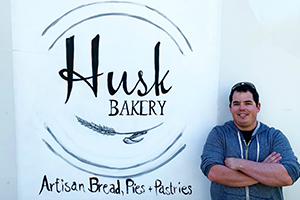 Husk Bakery Owner, Aaron Clark, has overcome bushfires, hailstorms and now COVID-19 to see his business succeed.
Husk Bakery Owner, Aaron Clark, has overcome bushfires, hailstorms and now COVID-19 to see his business succeed.
During the bushfires, he was worried customers wouldn’t come to his market stall at the Capital Region Farmers Market and The Southside Farmers Market on the weekends due to the bushfire smoke. Then, a huge hail storm damaged the refrigeration unit and needed repair. Once that was fixed, Covid-19 hit and he needed to start making money during the middle of a pandemic as people weren’t visiting the farmers’ markets.
Free COVID-19 record-keeping app for Canberra hospitality businesses
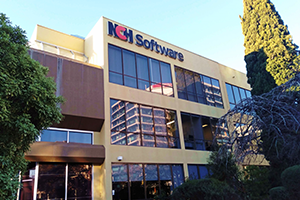 NCH Software, a local Canberra-based software company has launched a free COVID-19 record-keeping app for Canberra hospitality businesses to easily and securely collect customer contact details as required by state governments for COVID-19 contact tracing.
NCH Software, a local Canberra-based software company has launched a free COVID-19 record-keeping app for Canberra hospitality businesses to easily and securely collect customer contact details as required by state governments for COVID-19 contact tracing.
Silver Lining Mining in the Creative Sector
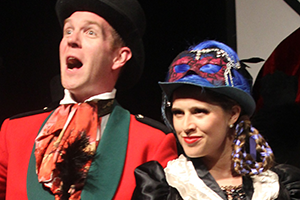 The Australian creative sector employs hundreds of thousands of people, with a high proportion of these being sole trader contractors, SMEs and casuals. It contributes around $111 billion to the Australian economy including over $3.5 billion in exports. The industry is reliant on national and international touring, audiences attending venues and participating in training and education programs. According to the Australian Bureau of Statistics1, in 2017-18, eighty-two percent of Australian’s over the age of 15 had attended a cinema, art gallery, museum, library, or live performance. Live performances account for over 38percent of these attendances.
The Australian creative sector employs hundreds of thousands of people, with a high proportion of these being sole trader contractors, SMEs and casuals. It contributes around $111 billion to the Australian economy including over $3.5 billion in exports. The industry is reliant on national and international touring, audiences attending venues and participating in training and education programs. According to the Australian Bureau of Statistics1, in 2017-18, eighty-two percent of Australian’s over the age of 15 had attended a cinema, art gallery, museum, library, or live performance. Live performances account for over 38percent of these attendances.
How Claire Corby is helping home buyers overcome their blind spots
 Claire Corby is a buyer’s agent. She is the kind of person you want in your corner if you are planning to buy a house, especially now that online auctions and virtual tours have become part of the buying process.
Claire Corby is a buyer’s agent. She is the kind of person you want in your corner if you are planning to buy a house, especially now that online auctions and virtual tours have become part of the buying process.
Research by Allianz at the end of 20191 found that one in two people found the home buying process stressful, affecting their mental and emotional wellbeing. Lack of information was identified as one of the biggest stressors. Now add the fear and uncertainty around COVID-19 to this already stressful process and both buyers and sellers are left feeling nervous. While an agent and auctioneer act in the best interests of the seller, a buyer’s agent is an advocate for the buyer.
Education disrupted: Online learning is more than click and read
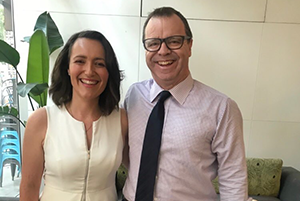 As many people are discovering, not all online learning is created equal. The coronavirus quarantine has brought to the fore both the challenges and opportunities associated with learning remotely and the experience has been quite varied amongst learners.
As many people are discovering, not all online learning is created equal. The coronavirus quarantine has brought to the fore both the challenges and opportunities associated with learning remotely and the experience has been quite varied amongst learners.
- Families: Many families of school-age students have been forced to grapple with the complexities of learning from home, such as technology issues, variable levels of computer literacy, managing kids of different ages and learning styles, the need for well-structured lessons, finding ways to encourage social interaction, balancing the volume of work, and maintaining motivation for self-directed learning.
- Job seekers: There are people who are nervous about their employment prospects and are looking at online courses as a way of re-skilling and improving their employability prospects in what will be a tough job market.
- People with disabilities: People with anxiety and other mental health conditions and those with mobility impairments that have found it difficult to attend lectures on campus in the past, may find online learning better meets their needs.

